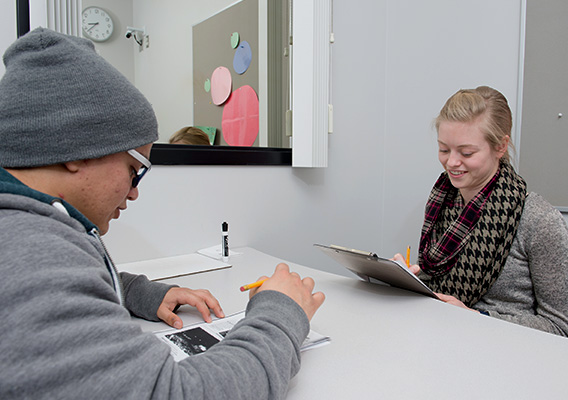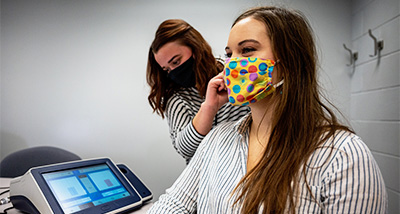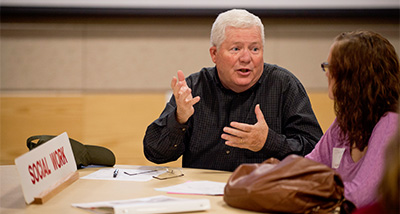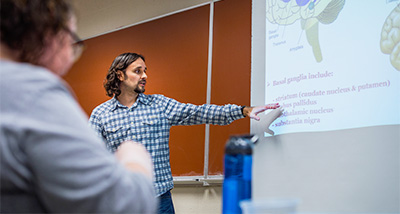
Why Study Communication Sciences and Disorders?
Graduate | Communication Sciences and Disorders | CEBAH
UWRF's Master of Science in Communication Sciences and Disorders program prepares students for professional careers in speech-language pathology. Graduates work in public schools, hospitals, rehabilitation centers, nursing homes, universities and private practice.
This is a full-time program which takes two years (five consecutive semesters beginning with fall term) to complete. Students are eligible for the certificate of clinical competency from American Speech-Language-Hearing Association (ASHA) after completion of the clinical fellowship and with passing grades on the Praxis™ Series examination. Required clinical experience is available through the UWRF Speech-Language & Hearing Clinic, public schools, hospitals, rehabilitation agencies and long-term care facilities.
Who is this program designed for?
- Students who are preparing for employment in a clinical fellowship
- Experienced clinical employees who want to receive their master's degree
Program Details
Admission Requirements
Requirements for admission include:
- A completed application
- A baccalaureate degree from an accredited institution
- A major in Communication Sciences and Disorders or demonstration of prerequisite coursework taken, as described below.
Required Prerequisites
- Language Development
- Anatomy/Physiology of the Speech System and Auditory System
- Phonetics
- Speech Science (including the physics of sound and acoustic characteristics of speech)
- Audiology (including hearing measurement and hearing disorders)
- Aural Rehabilitation
Preferred Prerequisites:
- Articulation/Phonological Disorders
- Fluency Disorders
- Child Language Disorders
- Voice and Resonance Disorders
Application Process
Fall Application Cycle Begins in July. Please note that there are TWO applications required.
- CSDCAS: including application, personal statement, letters of recommendation and official transcripts. Details are noted below.
- UW System Admissions application and fee payment. Note: You do NOT need to submit a statement essay on the UW System application, even though it asks for one.
Do not send any materials directly to the CSD program at UWRF.
Application Requirements
- The deadline for your CSDCAS application is 11:59 p.m. EST on Jan. 14, 2025. The application portal will close at 12 midnight EST on Jan. 15, 2025. (Please note that deadlines are Eastern Standard Time!)
- Your personal statement must be limited to 500 words and should address:
- Why you are interested in the CSD program at UWRF;
- What you feel you can contribute to the program;
- What your expectations are and what you want to gain from the program.
- You must submit official transcripts from all accredited colleges or universities attended.
- You may need to update your CSDCAS application with these after the deadline (i.e. fall 2024 transcripts).
- A minimum of three letters of recommendation are required. At least two of those should be from faculty members in the field of communication sciences and disorders (Ph.D. or clinical). All letters of recommendation must be submitted by the deadline or your application will not be considered.
- International students can find more information through this link.
- Incomplete applications will not be reviewed. Deferral of admission is not offered by the UWRF CSD graduate program.
- ALL college and/or university transcripts, including any high school courses taken for college credit. Transcripts MUST be sent directly to CSDCAS either electronically or by mail.
- Electronic transcripts can be sent to CSDCAS through Credentials Solutions, Parchment or the National Student Clearinghouse. Please choose Application Service and then in the dropdown menu, choose CSDCAS as the recipient. Do not enter an email address for CSDCAS, it will populate automatically when you choose CSDCAS.
- Transcripts can be mailed to the following address:
- CSDCAS Verification Department
PO Box 9113
Watertown, MA 02471
- CSDCAS Verification Department
Be sure to order transcripts EARLY to ensure they are delivered to CSDCAS on time. Transcripts ordered after the January 15 deadline will not be accepted and will result in your application being ineligible for review. You will need to request a new transcript after January 1 if you have completed courses during the fall semester or are taking courses spring semester.
The application process for fall begins in July. All application materials, with the exception of the UW-System online application for graduate school, will be submitted through the CSDCAS website. All application materials are due January 15 and only completed applications will be reviewed. The deadline for your CSDCAS application is 11:59 p.m. EST on Jan. 14, 2025. The application portal will close at 12 midnight EST on Jan. 15, 2025. (Please note that deadlines are Eastern Standard Time!)
Contact CSDCAS customer service with any questions or concerns by calling 617-612-2030, emailing support@csdcas.myliaison.com or visiting CSDCAS Applicant Help Center - Liaison (liaisonedu.com).
Total credits to degree: 54
Required Specialization Courses, 34 credits:
CSD 715 Research Methods in Communicative Disorders
CSD 716 Anatomy and Physiology of the Central Nervous System, 2 credits
CSD 717 Cognitive Disorders in Adults, 3 credits
CSD 720 Cleft Palate and Craniofacial Anomalies, 1 credit
CSD 730 Audiology II, 3 credits
CSD 737 Auditory Processing and Auditory Processing Disorder, 2 credits
CSD 739 * Techniques in Communication Sciences and Disorders, 3 credits *required for schools placement
CSD 740 Voice Disorders 1 Credit
CSD 750 Dysphagia, 3 credits
CSD 757 Motor Speech Disorders, 2 credits
CSD 762 Developmental Language Disorders, 3 credits
CSD 764 Augmentative/Alternative Communication Systems, 3 credits
CSD 765 Aphasia, 3 credits
CSD 768 Language and Literacy, 2 credits
CSD 770 Articulation/Phonology and Fluency Disorders, 3 credits
CSD 787 Counseling Issues in Communication Sciences and Disorders, 1 credits
Elective Courses, 0-8 credits
CSD 798 Independent Research, 1-4 credits
CSD 799 Thesis, 1-4 credits
Required Clinical Experience, 20 credits:
CSD 579 Clinical Experience Internship, 6 credits
CSD 771 Audiology Practicum 1, one credit
CSD 772 Audiology Practicum 2, one credit
CSD 773 Practicum in the School, 0 or 6 credits
CSD 774 Practicum in Rehabilitation Facilities, 6 or 12 credits
Students must choose one of the following plan options.
Plan A
Oral and written exam.
Plan B
Oral and written exam.
Plan C
A minimum of 54 semester credits of graduate work. Written comprehensive exam.
The Master of Science (M.S.) education program in speech-language pathology (residential) at the University of Wisconsin-River Falls is accredited by the Council on Academic Accreditation in Audiology and Speech-Language Pathology of the American Speech-Language-Hearing Association, 2200 Research Boulevard, #310, Rockville, MD, 20850, 800-498-2071 or 301-296-5700.
Communication Sciences and Disorders
uwrfcsd@uwrf.edu // 715-425-3801
Your Degree:
Graduate
Area of Study:
Communication Sciences and Disorders
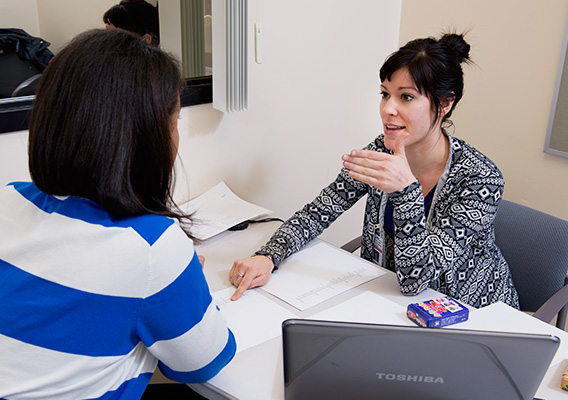
Skills and Learning Outcomes
- Understand and describe the biological and neurological bases of normal human communication.
- Develop skills needed for professional careers in speech-language pathology
- Describe the causes, characteristics, prevention, assessment and intervention strategies for articulation/phonological language, hearing, voice and fluency disorders.
- Hone your ability to empathize and relate to people from a variety of backgrounds.
Types of Courses
- Aphasia
- Audiology Practicum
- Cleft Palate and Craniofacial Anomalies
- Cognitive Disorders in Adults
- Developmental Language Disorders
- Dysphagia
- Language and Literacy
- Motor Speech Disorders
- Voice Disorders
